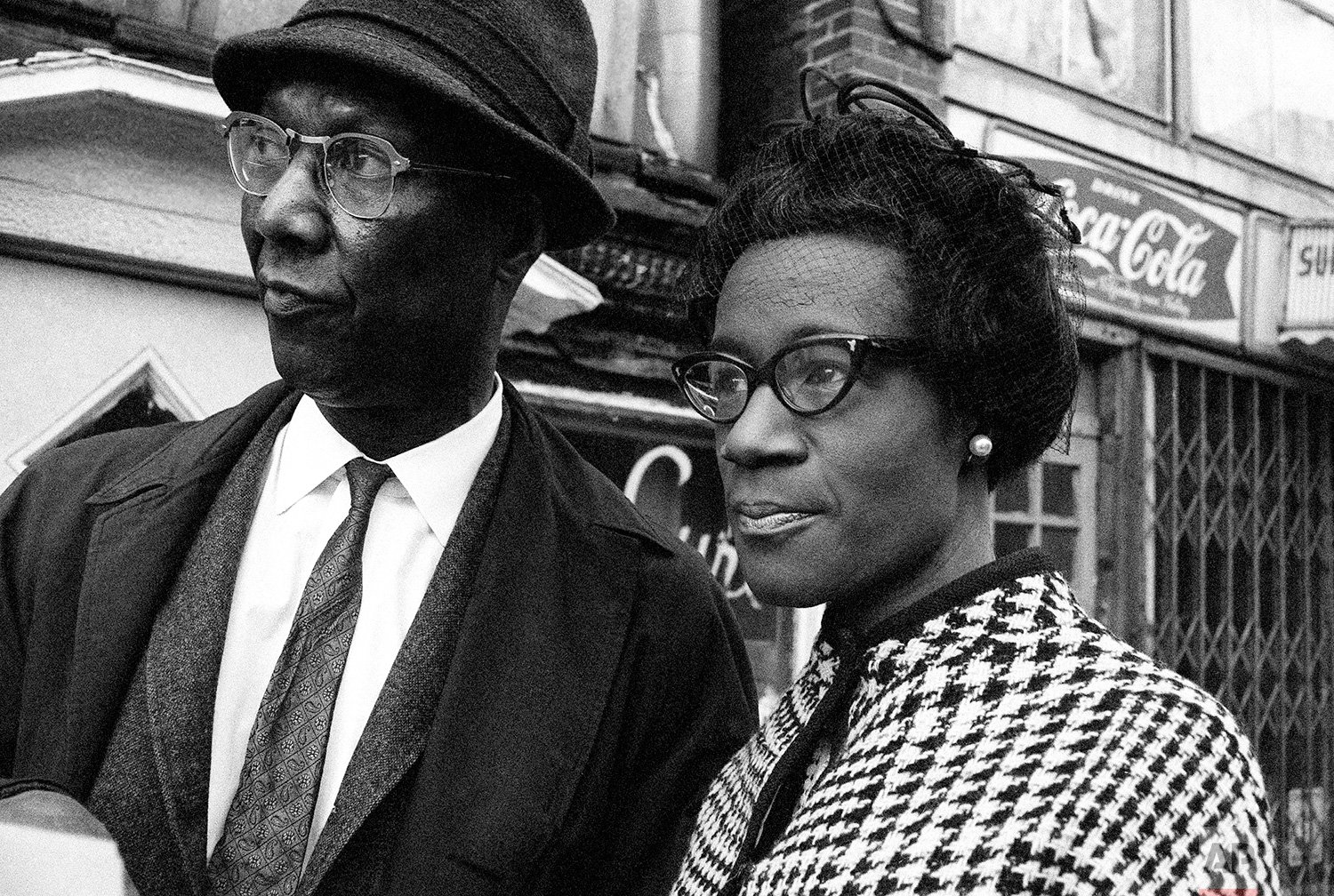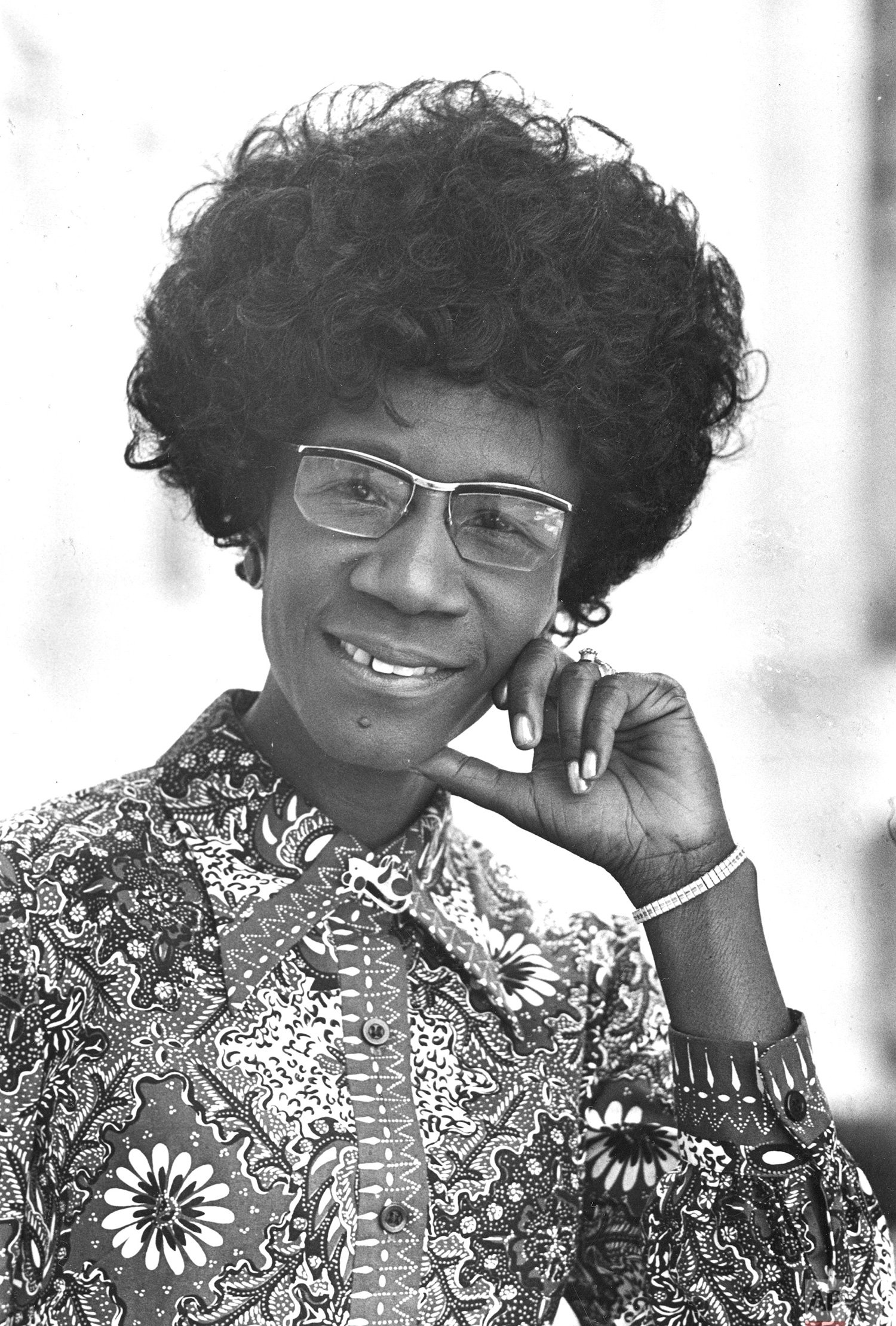Shirley Chisholm: "I am the candidate of the people of America."
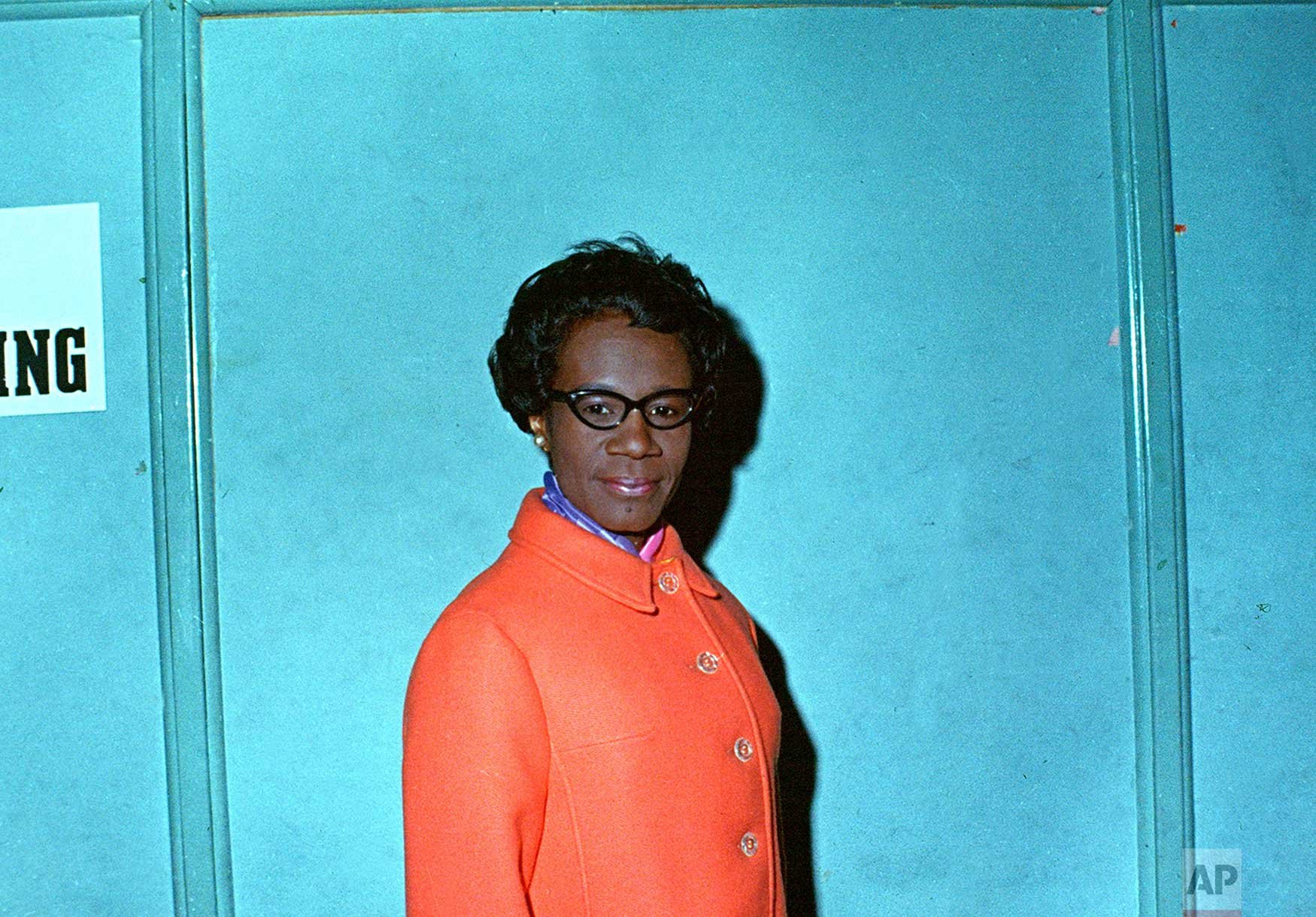
Shirley Chisholm was known for her many “firsts” – First Black congresswoman, first Black woman to serve on the powerful House Rules Committee, and the first Black woman to seek the presidency of the United States. An outspoken advocate for the rights of women, minorities and working people, Chisholm served seven terms in Congress. She worked to end the war in Vietnam, improve access to education and child care, and to create a more equitable America. She was a founding member of both the Congressional Black Caucus and the Congressional Women’s Caucus.
“I get discouraged when I see I’m just one person and can’t cure the ills of 300 years. But I’m going to fight for my people. It’s a tremendous challenge and I accept it.” (Shirley Chisholm, 1969)
Rep. Shirley Chisholm, (D-NY), addresses about 400 people in the gymnasium of the Cambridge Community Center, Cambridge, Mass., Feb. 15, 1972 where she opened her campaign for the presidency. (AP Photo/Bill Chaplis)
“I am not the candidate of black America, although I am Black and proud. I am not the candidate of the women’s movement of this country, although I am a woman and I’m equally proud of that. I am not the candidate of any political policies or fat cats or special interests. I stand here now, without endorsements from any big name politicians or celebrities or any other kind of prop. I do not intend to offer you the tired cliches that have too long been accepted part of our political life. I am the candidate of the people of America.”
(Shirley Chisholm announcing her candidacy for president, January 25, 1972. )
Rep. Shirley Chisholm of Brooklyn's 12th Congressional District is pictured in New York, Oct. 2, 1970. (AP Photo/Jim Wells)
Shirley Anita St. Hill was born in Brooklyn on November 30, 1924, to Charles St. Hill, a factory laborer from Guyana, and Ruby Seale St. Hill, a seamstress from Barbados. After spending part of her childhood with her maternal grandparents in Barbados, Chisholm returned to Brooklyn to re-join her parents and to complete her education. She attended Girl’s High School and Brooklyn College, graduating cum laude with a BA in sociology in 1946. While working in early childhood education, Chisholm earned a master’s in childhood education from Teachers College of Columbia University in 1951.
Chisholm became involved in local Brooklyn politics and began her political career in earnest in 1964 when she was elected to the New York state legislature, the second Black woman to serve in Albany. In 1968 she was elected to represent a newly created US congressional district in Brooklyn’s Bedford-Stuyvesant neighborhood, becoming the first Black Congresswoman. Chisholm’s work in both Albany and Washington was focused on improving the lives of women and underserved populations. She supported the equal rights amendment, legislation to fund school lunches, childcare, student aid, and guaranteed minimum annual income for families.
Despite opposition from members of her own party, entrenched sexism and racism in politics, and a lack of funding, Chisholm pursued her historical bid for the Democratic presidential nomination in 1972. Chisholm often used the phrase “Unbought and Unbossed,” to describe her independence from the “party machine” and politics as usual. It was the title of her 1970 autobiography and became a slogan for her presidential campaign. At the Democratic National Convention in Miami in 1972, she collected 152 delegate votes, 10 percent of the votes cast, making history, and paving the way for future generations.
“I ran for the Presidency, despite hopeless odds, to demonstrate the sheer will and refusal to accept the status quo.”
Chisholm continued to represent her Bedford-Stuyvesant community until her retirement in 1983. "When I ran for the Congress, when I ran for president, I met more discrimination as a woman than for being Black. Men are men," she told the Asssociated Press in 1982. In retirement she taught at Mount Holyoke College. She continued to work on issues related to creating a more just society and co-founded the National Congress of Black Women and African American Women for Reproductive Freedom.
Shirley Chisholm died on January 1, 2005. She was posthumously awarded the Presidential Medal of Freedom in 2015. At the ceremony, President Barak Obama, remarked that when asked how she’d like to be remembered, Shirley Chisholm had an answer: “I’d like them to say that Shirley Chisholm had guts.”
The New York State legislature's only women lawmakers, all in the Assembly, get together at Capital in Albany, New York on March 18, 1965. Left to right, Mrs. Shirley Chisholm of New York City, Mrs. Dorothy Rose of Erie County, Mrs. Aileen Ryan of New York City and Mrs. Constance Cook of Ithaca. (AP Photo)
Julian Bond, center, who was refused a seat in the Georgia Legislature after taking a stand against U.S. action in Vietnam, appears as a guest, Jan. 25, 1966 in the New York State Legislature at Albany, New York. Assemblywoman Shirley Chisholm, Brooklyn Democrat, chats after introducing him in the Assembly. Sen. Basil A. Paterson, left, Manhattan Democrat, was host. (AP Photo)
Shirley Chisholm, who is running on the Democratic slate for the newly carved out 12th Congressional District in Brooklyn. She is opposing James Farmer for the seat in Congress. She is shown campaigning at Ebbets Field Housing project in New York on Oct. 26, 1968. Man at left is unidentified. (AP Photo/Leonard Bazerman)
Shirley Chisholm, who is running on the Democratic slate for the newly carved out 12th Congressional District in Brooklyn looks at posters for distribution with a young constituent. She is opposing James Farmer for the seat in Congress. She is shown campaigning at Ebbets Field Housing project in New York on Oct. 26, 1968. (AP Photo/Leonard Bazerman)
Shirley Chisholm (D-N.Y.), running in the 12th Congressional District in Brooklyn for a seat in the House of Representatives, is shown on Election Day, Nov. 5, 1968. Chisholm was elected and became the first Black woman representative to serve in Congress. (AP Photo)
Shirley Chisholm is surrounded by campaign workers flashing the victory sign, shortly after she won election to Congress from New York City's Bedford-Stuyvesant district, on Nov. 6, 1968. (AP Photo)
Shirley Chisholm will be the first Black congresswoman, shown Dec. 20, 1968. One of her priorities will be to extend throughout the country New York State’s SEEK program to help Blacks and Latinos get to college. (AP Photo/John Duricka)
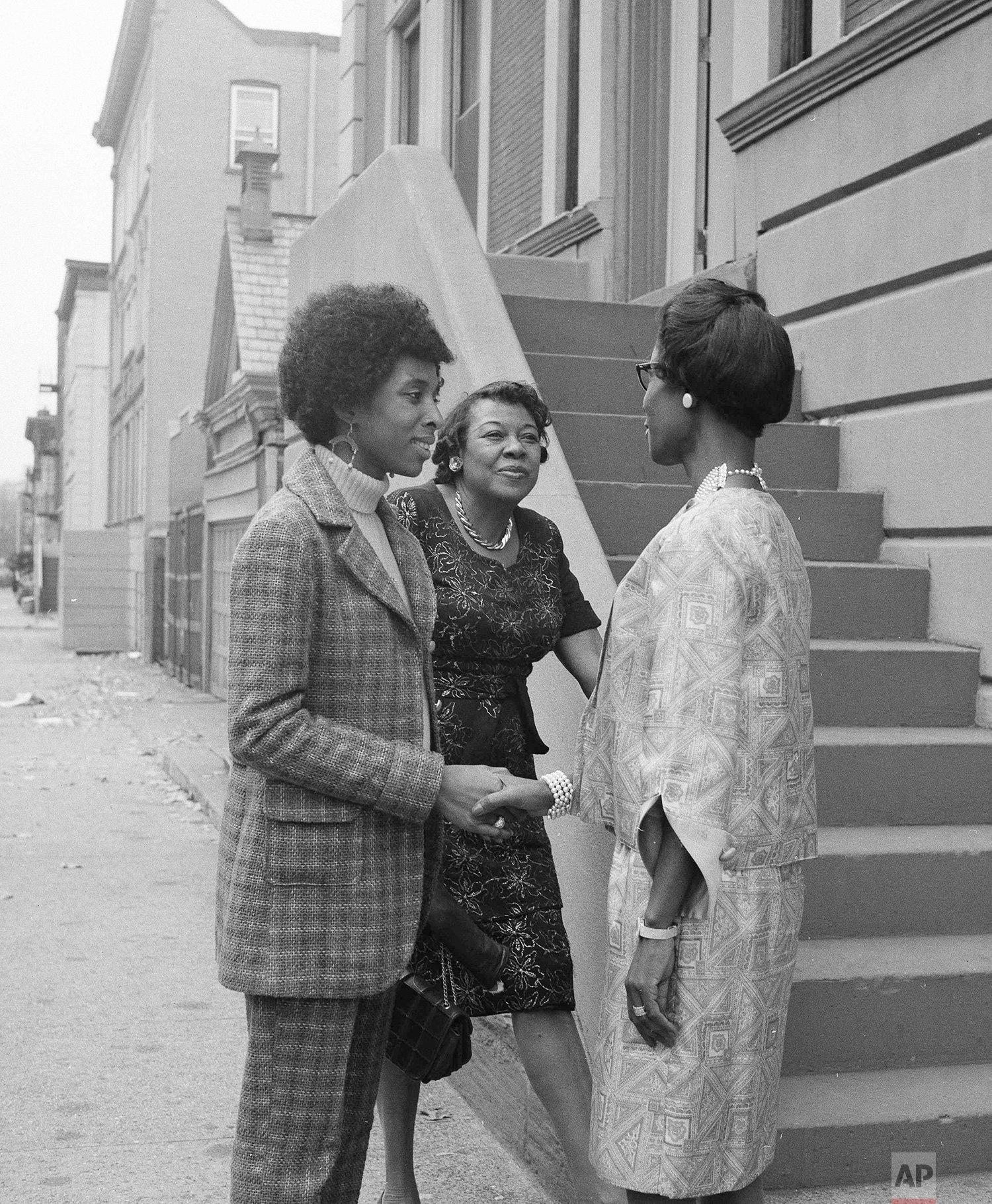
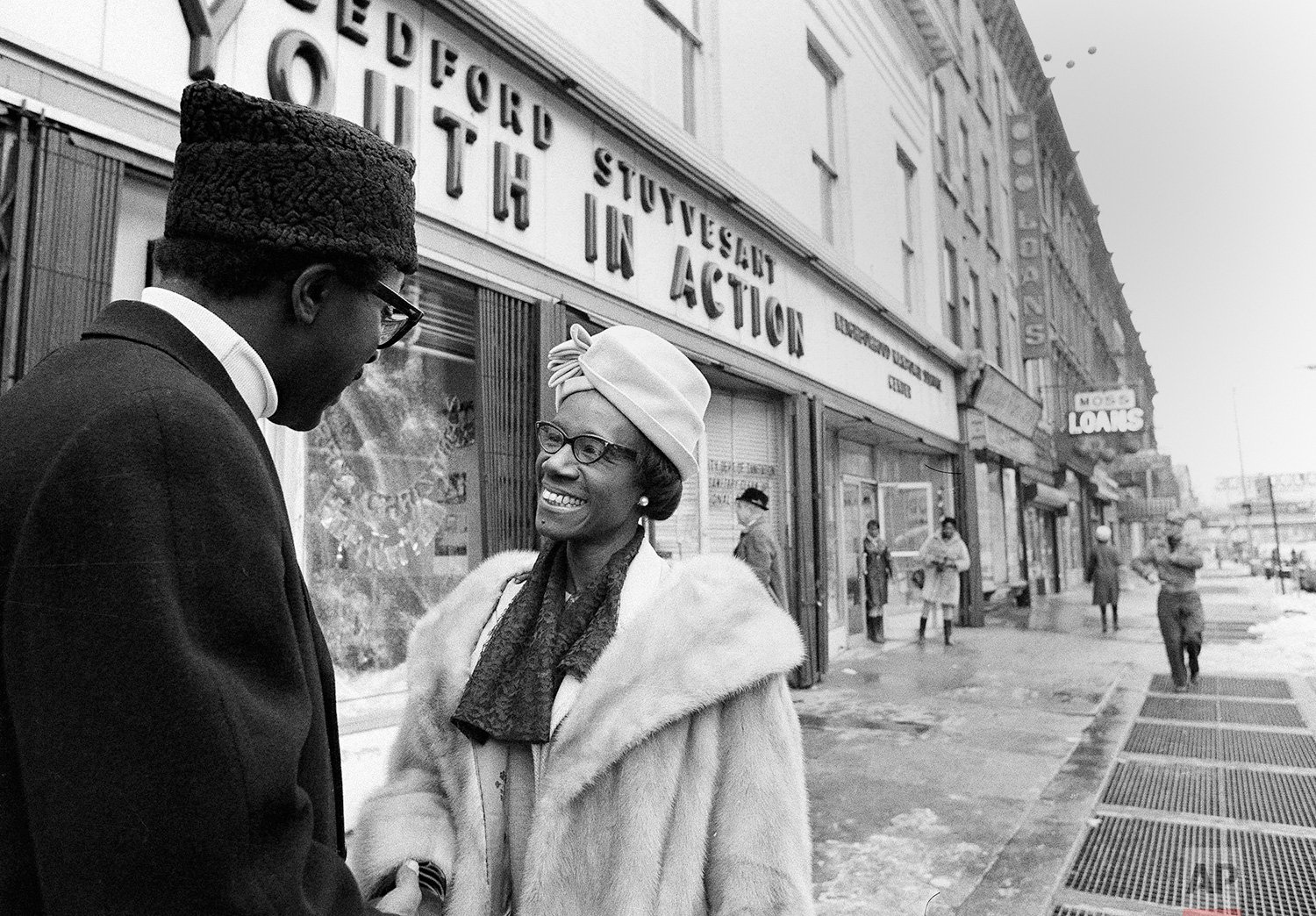
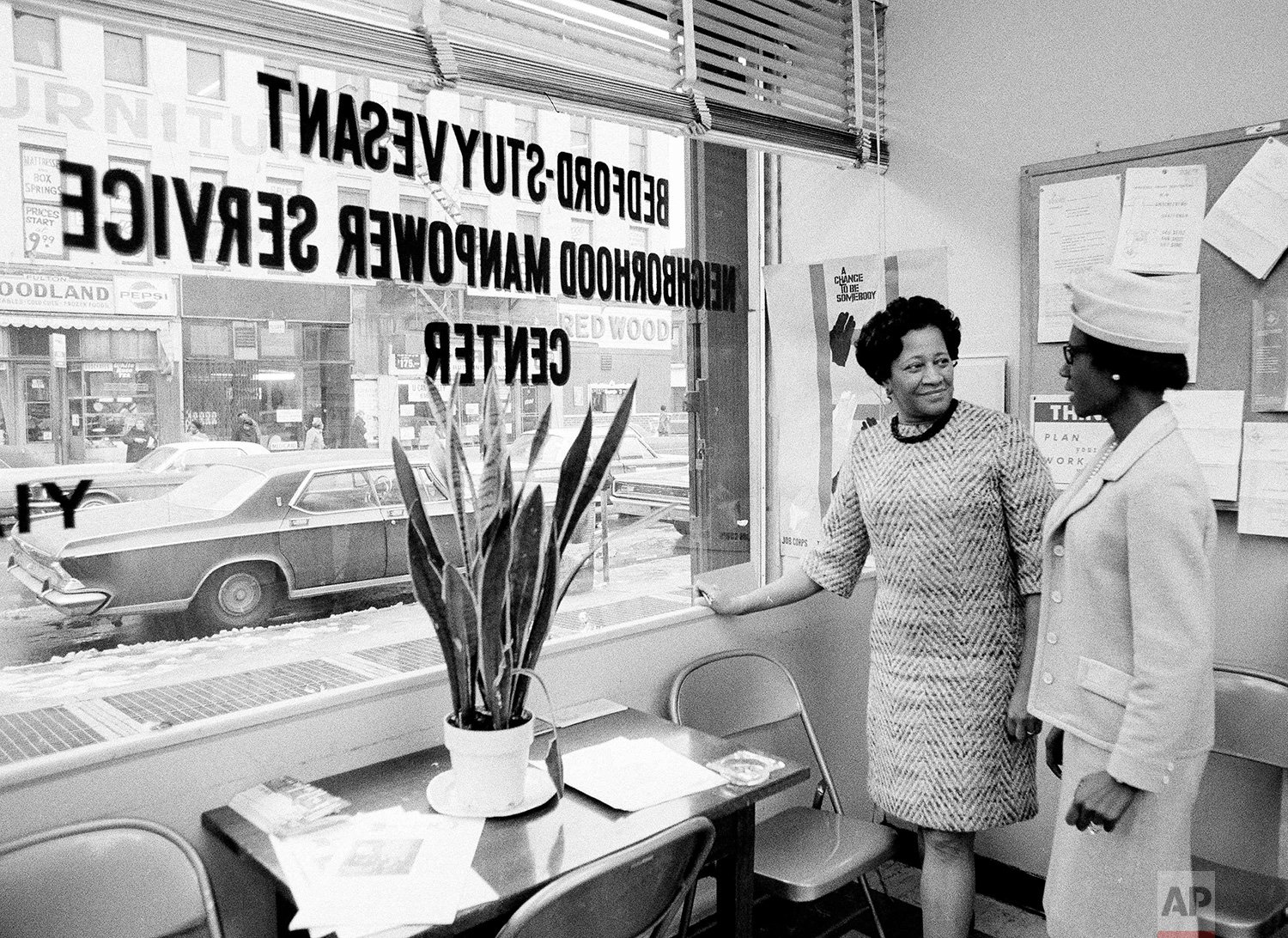
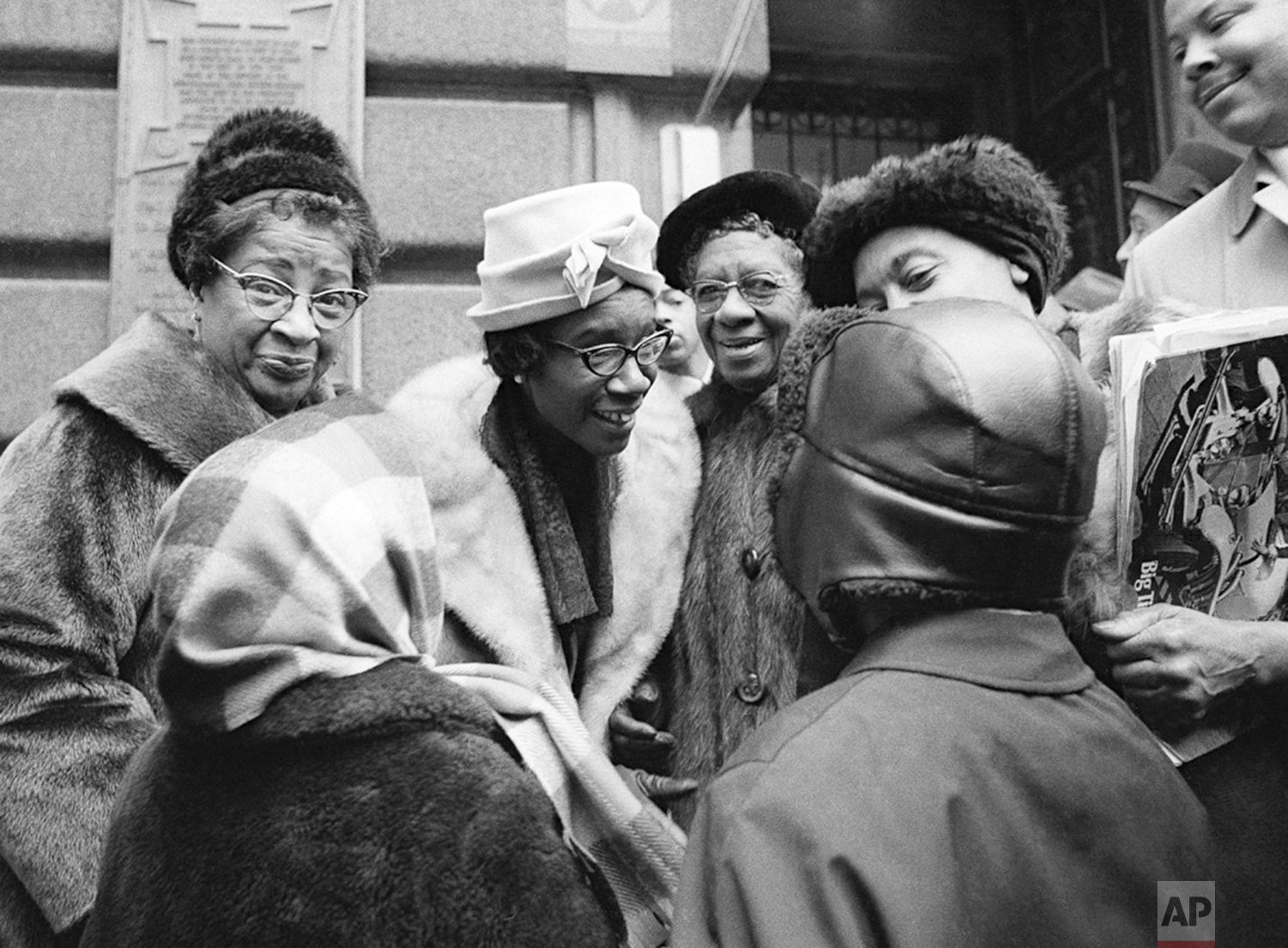
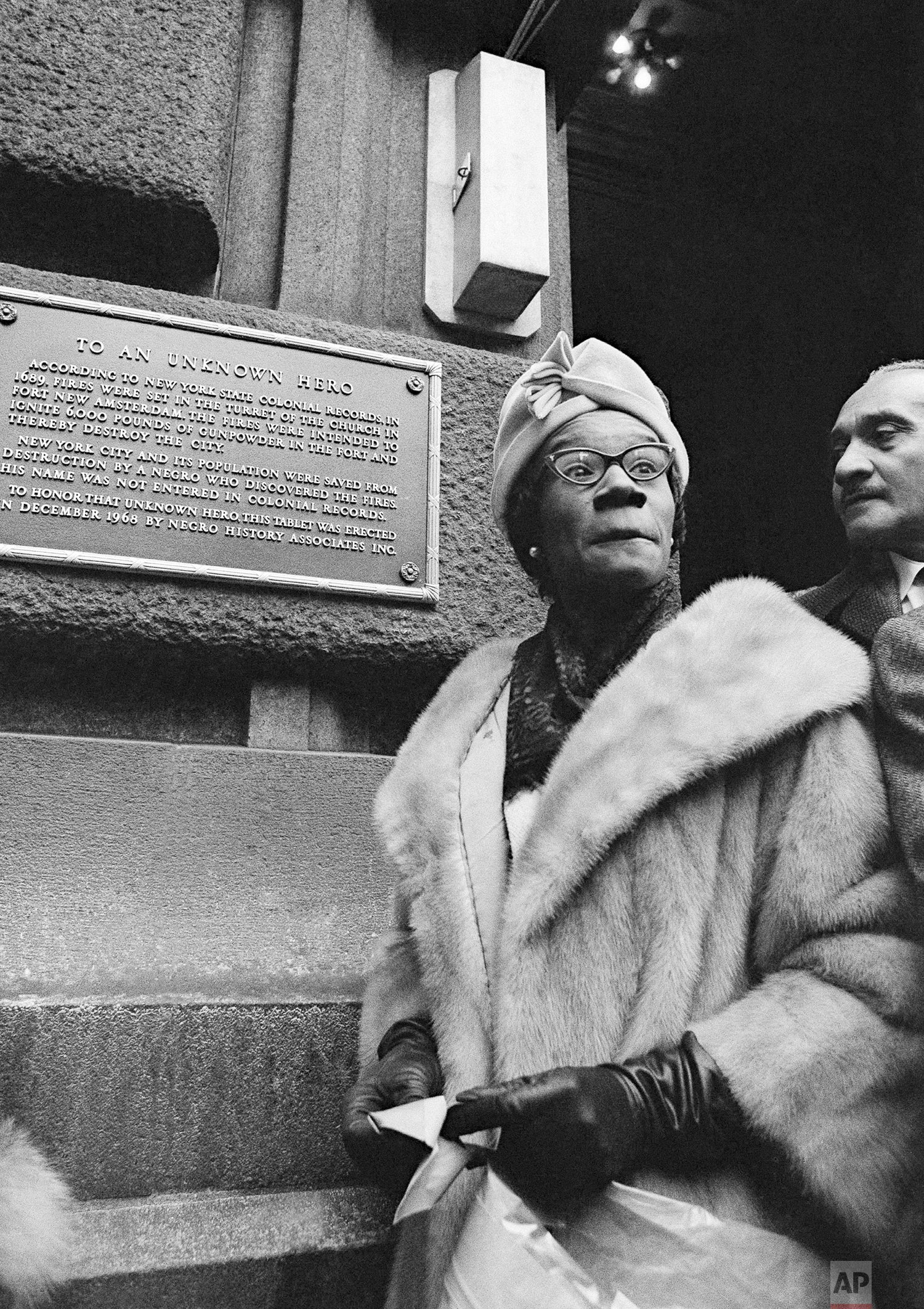
Rep. Adam Clayton Powell, D-Harlem, left, and Rep. Shirley Chisholm, D-Brooklyn, wave to the crowd on Seventh Ave. in Harlem while serving as grand marshals of the first Afro-American Parade in New York, Sept. 21, 1969. About 200 organizations participated in the parade, which was led by the Grambling College band from Louisiana. (AP Photo)
Democratic Congresswoman Shirley Chisholm of New York takes her oath of office, Jan. 3, 1969, in Washington, D.C. Administering the oath in this re-enactment of the swearing-in ceremony is Speaker John McCormack. (AP Photo)
Rep. Shirley Chisholm (D-N.Y.), poses on the steps of the Capitol in Washington, March 26, 1969 with material she plans to use in a speech before House colleagues. (AP Photo/Charles Gorry)
When Shirley Chisholm made her first speech on the floor of the House on March 26, 1969, she left no doubt about her priorities. She spoke out against the Vietnam War and the inflated defense budget. She vowed to vote against any increases in defense spending “until the time comes when our values and priorities have been turned right side up again, until the monstrous waste and the shocking profits in the defense budget have been eliminated and our country starts to use its strength, its tremendous resources, for people and peace, not for profits and war.”
Several members of the House of Representatives joined a group of demonstrators who gathered on the Capitol steps in Washington, June 18, 1969 to protest the war in Vietnam. The congressmen, from left center, are: Reps. William Clay (D-Mo.), head bowed; George Brown (D-Calif.), Shirley Chisholm (D-N.Y.), and Edward Koch (D-N.Y.). At left James Powell, chief of Capitol police, uses bullhorn to warn demonstrators of law violations. Some of the demonstrators were arrested. (AP Photo/Bob Daugherty)
Shirley Chisholm claimed her seat at the beginning of the 91st Congress in 1969, one of nine Black representatives who organized the Democratic Select Committee (DSC), a forum for the group to share common concerns. In 1971, the number of Black representatives rose to 13 and the group organized more formally as the Congressional Black Caucus (CBC). When President Richard M. Nixon refused to meet with the CBC, the members protested by boycotting the January 1971 State of the Union address, bringing national attention to issues faced by Black members of Congress and their constituents. Nixon relented and agreed to a meeting with members of the CBC in March 1971.
Black Congressmen, all Democrats, meet with President Richard M. Nixon in the White House Cabinet Room in Washington on March 25, 1971. Clockwise from lower right are Reps. Parren J. Mitchell, Maryland; Shirley Chisholm, New York; Charles C. Diggs Jr., Michigan; Nixon; Augustus F. Hawkins, California; William Clay, Missouri; Ronald V. Dellums, California; Nixon adviser Robert Finch; Hud Secretary George Romney; Walter Fauntroy, new D.C. delegate; Ralph H. Metcalfe and George H. Collins, Illinois; Robert N.C. Nix, Pennsylvania; Nixon adviser Clark MacGregor; John Conyers, Michigan; Louis Stokes, Ohiom and Charles B. Rangel, New York. (AP Photo)
Members of the National Women's Political Caucus tell a Washington news conference one of their goals is for women to comprise half of the delegates to the 1972 presidential conventions, on July 12, 1971. Seated from left: Gloria Steinem, member of the Democratic National Policy Council; Rep. Shirley Chisholm, D-N.Y.; and Betty Friedan, women's rights advocate. Standing is Rep. Bella Abzug, D-N.Y. (AP Photo/Charles Gorry)
Congresswoman Shirley Chisholm, D-N.Y., is seen in this 1971 photo. (AP Photo)
New York Congresswoman Shirley Chisholm is shown in downtown Miami, Florida as she joined sugarcane workers picketing the Talisman Sugar Company offices Feb. 24, 1972, during her campaign for the Democratic presidential nomination. (AP Photo/Jim Kerlin)
Shirley Chisholm prepares to kiss mayoral candidate Ed Koch in New York on Wednesday, Sept. 14, 1977, after she endorsed Koch for the New York office. The congresswomen said, he will fight “business as usual” in City Hall with independence and sheer grit. (AP Photo/Carlos Rene Perez)
A military honor guard salutes the flag draped casket of former U.S. Rep. Shirley Chisholm at the Birchwood Mausoleum in Forest Lawn Cemetery in Buffalo, N.Y., Tuesday, Jan. 11, 2005. Chisholm, the first Black woman to run for president, was entombed in Forest Lawn Cemetery next to her husband, former state Assemblyman Arthur Hardwick. (AP Photo/David Duprey)
"As she was a leader for her own generation, Shirley Chisholm will be an inspiration for generations to follow.”
(Nancy Pelosi commenting on the death of Shirley Chisholm, January 3, 2005)
House Speaker Nancy Pelosi of Calif., second from left, Congressional Black Caucus Chair Rep. Barbara Lee, D- Calif., left, and members of the CBC , from third from left, Rep. Maxine Waters, D-Calif., Del. Eleanor Holmes Norton, D-D.C., and Rep. Yvette Clarke, D-N.Y., applauded during the unveiling of the portrait of the late New York Rep. Shirley Chisholm, marking the 40th anniversary of Congresswoman Chisholm's swearing in as a Member of the House of representatives, Tuesday, March 3, 2009, on Capitol Hill in Washington. In 1968, Chisholm became the first African-American woman elected to Congress. (AP Photo/Manuel Balce Ceneta)
Photo editing and text by Francesca Pitaro.





